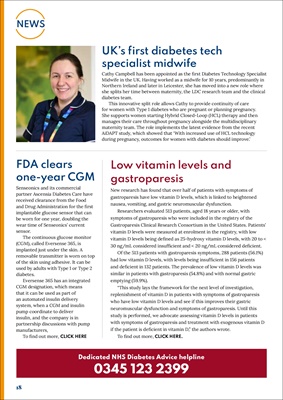
18
NEWS
UK's first diabetes tech
specialist midwife
Cathy Campbell has been appointed as the first Diabetes Technology Specialist
Midwife in the UK. Having worked as a midwife for 10 years, predominantly in
Northern Ireland and later in Leicester, she has moved into a new role where
she splits her time between maternity, the LDC research team and the clinical
diabetes team.
This innovative split role allows Cathy to provide continuity of care
for women with Type 1 diabetes who are pregnant or planning pregnancy.
She supports women starting Hybrid Closed-Loop (HCL) therapy and then
manages their care throughout pregnancy alongside the multidisciplinary
maternity team. The role implements the latest evidence from the recent
AiDAPT study, which showed that 'With increased use of HCL technology
during pregnancy, outcomes for women with diabetes should improve.'
FDA clears
one-year CGM
Senseonics and its commercial
partner Ascensia Diabetes Care have
received clearance from the Food
and Drug Administration for the first
implantable glucose sensor that can
be worn for one year, doubling the
wear time of Senseonics' current
sensor.
The continuous glucose monitor
(CGM), called Eversense 365, is
implanted just under the skin. A
removable transmitter is worn on top
of the skin using adhesive. It can be
used by adults with Type 1 or Type 2
diabetes.
Eversense 365 has an integrated
CGM designation, which means
that it can be used as part of
an automated insulin delivery
system, when a CGM and insulin
pump coordinate to deliver
insulin, and the company is in
partnership discussions with pump
manufacturers,
To find out more, CLICK HERE
Low vitamin levels and
gastroparesis
New research has found that over half of patients with symptoms of
gastroparesis have low vitamin D levels, which is linked to heightened
nausea, vomiting, and gastric neuromuscular dysfunction.
Researchers evaluated 513 patients, aged 18 years or older, with
symptoms of gastroparesis who were included in the registry of the
Gastroparesis Clinical Research Consortium in the United States. Patients'
vitamin D levels were measured at enrolment in the registry, with low
vitamin D levels being defined as 25-hydroxy vitamin D levels, with 20 to <
30 ng/mL considered insufficient and < 20 ng/mL considered deficient.
Of the 513 patients with gastroparesis symptoms, 288 patients (56.1%)
had low vitamin D levels, with levels being insufficient in 156 patients
and deficient in 132 patients. The prevalence of low vitamin D levels was
similar in patients with gastroparesis (54.8%) and with normal gastric
emptying (59.9%).
"This study lays the framework for the next level of investigation,
replenishment of vitamin D in patients with symptoms of gastroparesis
who have low vitamin D levels and see if this improves their gastric
neuromuscular dysfunction and symptoms of gastroparesis. Until this
study is performed, we advocate assessing vitamin D levels in patients
with symptoms of gastroparesis and treatment with exogenous vitamin D
if the patient is deficient in vitamin D," the authors wrote.
To find out more, CLICK HERE.
Dedicated NHS Diabetes Advice helpline
0345 123 2399